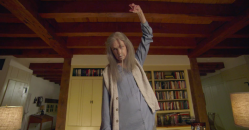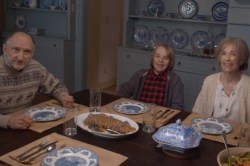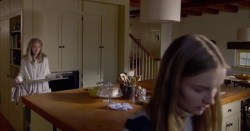 Universal Pictures
Universal PicturesThe Visit is one of those “found footage” horror movies. Since The Blair Witch Project’s massive success in 1999, the found footage conceit has often worked well: it instills creepy realism while also cleverly turning the restrictions of low-budget filmmaking into a plot device.
And it also works well, conveniently enough, to disguise mediocre filmmaking. After all, if the goal is the make the audience believe that what they’re watching is simply amateur, the bar of expectation is lowered considerably (basically to the level of “just give me a few jumps and scares and I’ll be happy”).
In the case of The Visit, the footage is supposed to be the home-made documentary of teenager Becca (Olivia DeJonge) as she and her younger brother Tyler (Ed Oxenbould) visit their grandparents for the first time. Ostensibly intended to be an investigatory documentary into old family secrets (a sort of tween attempt at Stories We Tell, perhaps), Becca’s film quickly morphs into horror as “Nana and Pop Pop” turn out to be very weird, perhaps even dangerous people.
The siblings’ seven-day stay at grandparents’ remote farm gets creepier by the day as Nana’s afterhours dementia (Pop Pop passes it off as “sundowning”) and Pop Pop’s mysterious work in the shed become gradually more ominous. All is captured on handheld home video and voila! We have a horror movie!
Some have said The Visit is a return to form for writer/director M. Night Shyamalan, whose last decent film was 2004’s The Village. If return to form means a return to genuinely jump-inducing moments and an unexpected plot twist, then maybe.
But the beauty of Shyamalan’s early films (The Sixth Sense, Unbreakable, Signs and The Village) is that they were so much more than horror. They had plot twists, yes, but they also had great acting (Joaquin Phoenix, Toni Collette, Bryce Dallas Howard and others turned in excellent performances in Shyamalan’s early films), visual and tonal subtlety, and genuine emotional resonance.
 Universal Pictures
Universal PicturesThe Visit attempts some of this, exploring broken family through the children’s mother’s strained relationship with her estranged husband and parents, even dabbling in the concept of forgiveness amidst family strife. But these elements feel forced and tonally at odds with the rest of the film, which is a campy B-movie fairy tale about children’s’ fears about grandparents being realized.
The campiness is where The Visit succeeds. It’s an often very funny scare-fest about all the strange, gross, creepy and sad things a pair of grandparent villains might do, as seen through a junior high gaze (the “documentary” conceit works well here, by placing the audience entirely within the sophomoric perspective of the grandkids).
Deanna Dunagan has a lot of fun as Nana, a deceptively sweet grandma who enjoys puzzles and walks by day but goes a little crazy after 9:30 p.m. Nana’s affection for baking (pot pie, bread pudding, cheddar biscuits, and of course grandma’s best cookies!) is endearing until she starts asking Becca to crawl into the oven to clean it from the inside.
 Universal Pictures
Universal PicturesAs Pop Pop, Peter McRobbie doesn’t get to have as much fun. His primary quirk has to do with adult diapers. Indeed, with its exploitation of elderly afflictions like incontinence and dementia, The Visit is borderline offensive at times, though not inconsistent with pop culture’s standard disrespect and stereotyping of “old people.”
Would a film that has so much fun at the expense of 70-somethings have been made fifty years ago? That’s probably a question for another essay.
Where The Visit is most interesting, though by no means groundbreaking, is when it comments reflexively on the “film within a film” conceit. Shyamalan goes out of his way to make the “found footage” aspect a point of interest, though not in a way that is crucial to the plot. At various times we see Becca “directing” scenes for maximum emotional impact. Tyler (the B camera operator) utilizes a slow zoom at one point to exploit his sister, who suffers from low self-esteem.
Both of them love being on camera and insert confessional commentary and play-by-play narration at every opportunity. They represent well their generation’s performative tendencies and “always have the camera on” instincts.
“Performance” is a major motif of The Visit. Several characters throughout the film say something to the effect of “I used to be an actor” and go on to recite part of a dramatic monologue. Tyler is an aspiring rapper and is often seen free-styling (when he’s not substituting pop singer names for curse words: “Oh Shakira!”). Pop Pop and Nana are also “performing” roles in a sense, trying on the grandparent life for the first time, sometimes awkwardly (playing a tense game of Yahtzee with the grandkids).
 Universal Pictures
Universal PicturesAnd by the end of the film, we aren’t completely sure that the “documentary” we just saw was actually a documentary or all just dramatized performance, perhaps Becca’s attempt at a meta mockumentary horror film? This theory would explain the film’s treacly, heavy-handed post-script about forgiveness (“don’t hold on to anger,” Becca hears from her mom), which feels like a 15 year-old filmmaker’s attempt at bringing gravitas to their film.
As it is, though, the amateurish fumbling after a “message” appears to be all Shyamalan, a sign that the once great filmmaker has yet to get his early-career groove back.
Caveat Spectator
The Visit is rated PG-13, which is rare for a horror film these days. But as scary as it is, The Visit is light on violence and blood. There are a few implied murders and some scenes of mostly off-screen brutality: attacking a character with shard of glass, banging a character’s head repeatedly with a refrigerator door. We see a few glimpses of corpses. Bodily disgust is a big thing in the film: vomit and dirty adult diapers are integral to the plot. We see a bit of rear nudity with Nana and a disturbing scene of Pop Pop taking his pants off (no nudity is shown). Profane language is minimal, though present periodically in the film.
Brett McCracken is a Los Angeles-based writer and journalist, and author of the books Hipster Christianity: When Church and Cool Collide (Baker, 2010) and Gray Matters: Navigating the Space Between Legalism and Liberty (Baker, 2013). You can follow him @brettmccracken.













